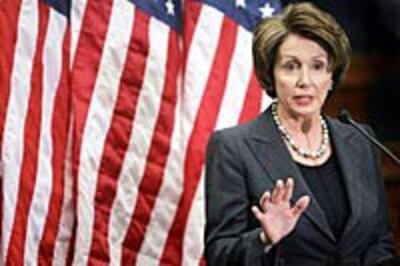
U.S. lawmakers are threatening to toughen trade terms with China following the announcement of a record U.S. $232.5 billion trade deficit with the country last year, but experts doubt that China will respond with meaningful steps.
In a Feb. 13 letter to President George W. Bush, House Speaker Nancy Pelosi and 13 other Democratic lawmakers called for the administration to present a plan within 90 days to eliminate the deficit with China. The letter also called for enforcement of World Trade Organization (WTO) rules against China’s violation of intellectual property rights.
Reps. Pelosi and Charles Rangel, a New York Democrat who chairs the House Ways and Means Committee, have proposed legislation that would raise tariffs on countries, such as China, that subsidize exports to the United States.
Meanwhile, a bipartisan Senate bill threatens to rescind China’s “permanent normal trade relations” (PNTR) status with the United States. The change would make favorable tariff treatment for Chinese products subject to annual review, as it was seven years ago.
In a statement, Senator Byron Dorgan, a North Dakota Democrat, said “China has engaged in systematic labor abuses, intellectual property theft and piracy, currency manipulation, and unfair barriers against U.S. exports. Congress can—and must—send a clear message that China needs to stop cheating and start trading fairly. Rescinding its PNTR status sends that message.”
Can bills pass?
When there’s a shift in power, either in the executive or in Congress, it is often the case that the newly-enhanced and the new positions of responsibility come out with a really tough rhetoric when it comes to China.
Foreign Policy
Experts interviewed by Radio Free Asia voiced doubts that any of the proposed measures would soon become law.
June Teufel Dreyer, a China specialist and chairman of the University of Miami political science department, said legislative threats on trade have increased since the Democrats took control of Congress in January.
“But whether they actually will have a chance of passing seems unlikely to me because of very significant dissension, and there are many, many members of Congress—House and Senate alike—in districts that profit from trade with China.”
In the past, punitive trade bills have been offered and then withdrawn in exchange for minor concessions or promises from China, Dreyer said. “Usually, these bills end up, sadly, being a lot of hot air,” she said.
“‘Sadly,’ from the point of view that people spend a lot of time talking about them...at the expense of time that could be better spent on legislation that has a better chance of passing and making a difference in our lives,” Dreyer said.
Dreyer added that it is unclear whether a return to annual U.S. debates over China’s PNTR status would be permitted under the rules of the WTO, to which China now belongs.
Shifts in power
William Dobson, managing editor of Foreign Policy magazine at the Washington-based Carnegie Endowment for International Peace, said the sudden increase in proposed China trade measures is typical of shifts in political power.
“When there’s a shift in power, either in the executive or in Congress, it is often the case that the newly enhanced and the new positions of responsibility come out with a really tough rhetoric when it comes to China,” Dobson said.
“And it’s also true, every time, that that rhetoric cools with time.”
Debate over proposed trade penalties usually gives rise to concern about the potential for damage on all sides, Dobson said.
“It’s important for [U.S. lawmakers] to stake out tough positions to impress different constituencies back home. But then, when it really gets to the matter of policymaking, there’s more consensus. And it’s consensus that shows China a greater deal of latitude than not.”
Dreyer said China has so far continued to pursue unfair trade policies despite negotiations, diplomacy, or legislative threats. “I don’t think it’s going to ultimately make any difference,” Dreyer said.
“And I think that next year, you and I will probably be talking about the latest ‘record increase’ in the trade deficit.”
Original reporting by Michael Lelyveld. Edited for the Web by Richard Finney.
